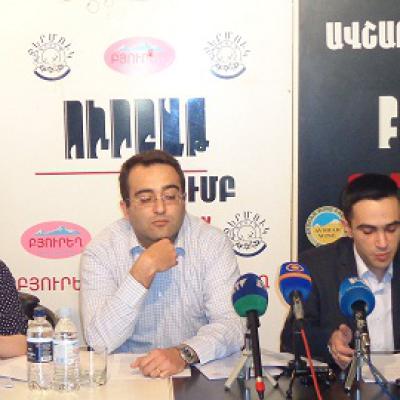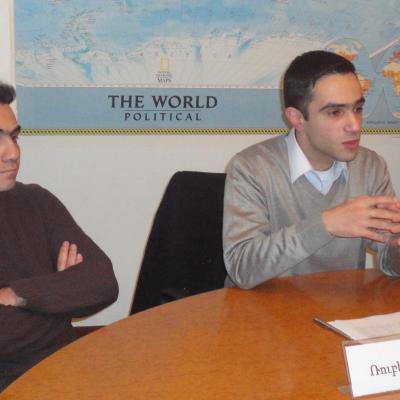01-03-2019
 On February 26, 2019 “Advanced Public Research Group” (APR Group) NGO organized the presentation of the research report on collective labor rights protection mechanisms, as well as public discussions on further trade union reforms and improvement of efficiency of trade union activities.
On February 26, 2019 “Advanced Public Research Group” (APR Group) NGO organized the presentation of the research report on collective labor rights protection mechanisms, as well as public discussions on further trade union reforms and improvement of efficiency of trade union activities.
In her opening speech Somer Bessire Briers, political officer at the US Embassy in Armenia emphasized the importance of labor rights protection and added that strong trade unions are key to protection of those rights and expressed the readiness of the embassy to support efforts targeting labor rights protection.
Afterwards, APR Group project team presented the main findings and recommendations of the research, which were aiming at revealing legislative and practical gaps in the field of trade union activities, as well as identification of effective solutions to those issues. Particularly, when speaking about further trade union reforms and improvement of efficiency, Ruben Sargsyan, Chairman of APR Group outlined the need for legislative reforms to enlarge the rights and tools of trade unions to promote collective labor rights protection. In this context, APR Group highlighted that trade unions need legal opportunities and tools to present the rights of employees at courts, as well as identify guarantees which would increase the role of trade unions in regulation of labor disputes, such as having trade unions opinion or consent when discharging a member of trade union, defining disciplinary penalty etc.
The other important issue voiced at the event was the lack of transparency and accountability of trade union activities. Because of lack or shortage of information, reports and other publications on trade union activities during recent years it was impossible to form a comprehensive picture on the efficiency of trade union activities. Similar issues exist in use of financial and other resources of trade unions as there is no information on activities related to labor rights protection, including court cases, strikes etc. According to open data, trade unions have about 191,000 members and according based on hypothetic calculations, in case of minimal salary of AMD 55.000 and 1% membership fee, trade unions get about AMD 2.5 billion annually. Although calculations are not correct enough, however, they come to prove availability of considerable financial resources within trade unions with no assessments or open information of efficiency of use of funds.
Other challenges and important recommendations include issues related to collective agreements, social partnership which also need attention and further improvement.
Zhora Sargsyan, representative from the Ministry of Labor and Social Affairs, spoke of trilateral partnership and stated that its frequency is clear and preserved. In that context he mentioned organizations recommendations on chairing sessions, secretariat and content of sessions are acceptable and welcomed. The Ministry representative called for presentation of comprehensive recommendations targeting reforms in the entire system and not to highlight separate articles that need revisions. In this regard it’s important stating that coordination of this sector and as well as development and implementation of the sectoral policy is the direct responsibility of the Ministry and the research recommendations aim at reforming also Government approaches.
Boris Kharatyan, Deputy Director of the Confederation of Trade Unions of Armenia, expressed his consent to the majority of recommendations raised by the research and stated that trade unions, however, are accountable before their members and don’t have any obligations to present any report to the public.
Speaking about the transparency of trade unions. Levon Sardaryan, Chairman of independent trade union of journalists outlined that trade unions are public organizations and are accountable before all. The majority of participants also agreed to this statement pointing out that presentation of figures and reports would increase the quantity of people wishing to become members of trade unions.
MP Heriknaz Tigranyan presented her vision on regulations for organizing strikes thus bringing more justifications to the research recommendations.
Gagik Makaryan, Chairman of the Union of Employers called trade unions to activate their work. While agreeing to several recommendations, Mr. Makaryan also outlined that trade unions should work with their members and not only generate revenue from other sources, such as space rental.
To summarize, it’s worth mentioning that in spite of legislative restrictions trade unions don’t act proactively and carry out actions supporting the ideology of labor rights protection which, in its turs, decreases the role of trade unions, public trust and increases vulnerability employees. Only during recent years, the number of collective agreements between employers, trade unions and employees has decreased to 520 while in 2010 the number of collective agreements was 857 according to data published by trade unions themselves.
Taking into account the research issues and recommendations, APR Group will continue public advocacy campaign, including open discussions with stakeholders, work with the legislative body to improve the legislative environment, as well as projects targeting capacity building of trade unions, improvement of their efficiency, accountability and transparency.
This research was carried out within the framework of “Supporting to mechanisms for collective protection of labor rights” which is funded by the US Department of State and implemented by “Advanced Public Research Group” NGO.
The research report can be downloaded here.







